Marketing Report: Sustainable Practices of FMCG Companies Analysis
VerifiedAdded on 2022/10/08
|12
|2695
|25
Report
AI Summary
This report delves into the realm of sustainable marketing, focusing on the practices of FMCG companies like Pepsico, Wesfarmers, and Woolworths. It examines the application of leadership theories, particularly the 'Great Man' and 'Trait' theories, in the context of sustainable decision-making, and the 'Performance with Purpose' framework. The report critiques the management decisions of these companies, highlighting instances of greenwashing and the impact of corporate social responsibility initiatives. It analyzes the social impacts of these companies, referencing sustainability reports and governmental interventions. Furthermore, the report provides short-term and long-term management recommendations to enhance consumer trust and ensure genuine commitment to sustainable practices, including transparency, employee empowerment, and adherence to ethical guidelines. The report aims to provide a thorough overview of sustainable marketing strategies and their implications for FMCG businesses.

Running head: MARKETING
Sustainable marketing
Name of the student:
Name of the university:
Author note:
Sustainable marketing
Name of the student:
Name of the university:
Author note:
Paraphrase This Document
Need a fresh take? Get an instant paraphrase of this document with our AI Paraphraser
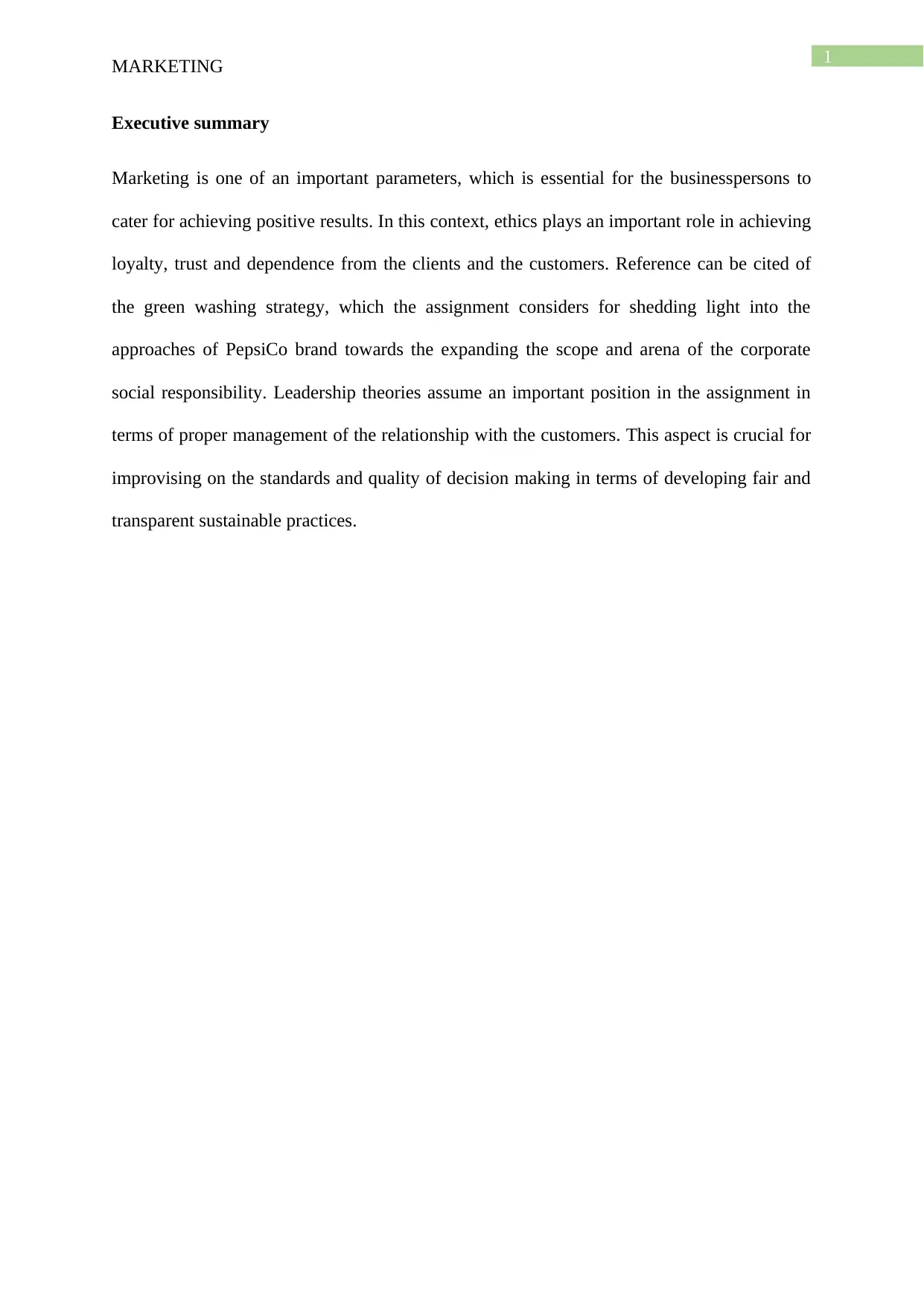
1
MARKETING
Executive summary
Marketing is one of an important parameters, which is essential for the businesspersons to
cater for achieving positive results. In this context, ethics plays an important role in achieving
loyalty, trust and dependence from the clients and the customers. Reference can be cited of
the green washing strategy, which the assignment considers for shedding light into the
approaches of PepsiCo brand towards the expanding the scope and arena of the corporate
social responsibility. Leadership theories assume an important position in the assignment in
terms of proper management of the relationship with the customers. This aspect is crucial for
improvising on the standards and quality of decision making in terms of developing fair and
transparent sustainable practices.
MARKETING
Executive summary
Marketing is one of an important parameters, which is essential for the businesspersons to
cater for achieving positive results. In this context, ethics plays an important role in achieving
loyalty, trust and dependence from the clients and the customers. Reference can be cited of
the green washing strategy, which the assignment considers for shedding light into the
approaches of PepsiCo brand towards the expanding the scope and arena of the corporate
social responsibility. Leadership theories assume an important position in the assignment in
terms of proper management of the relationship with the customers. This aspect is crucial for
improvising on the standards and quality of decision making in terms of developing fair and
transparent sustainable practices.
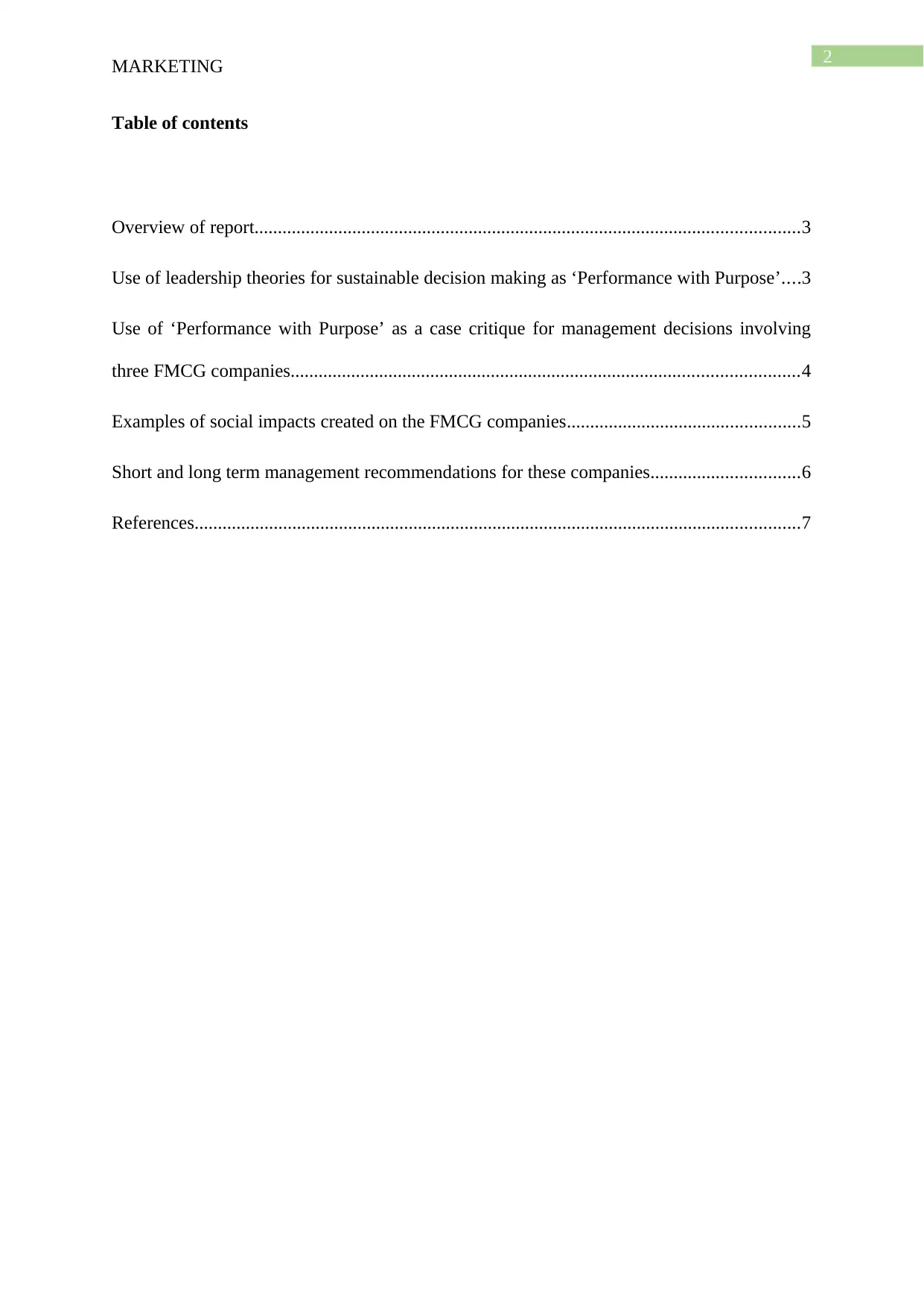
2
MARKETING
Table of contents
Overview of report.....................................................................................................................3
Use of leadership theories for sustainable decision making as ‘Performance with Purpose’....3
Use of ‘Performance with Purpose’ as a case critique for management decisions involving
three FMCG companies.............................................................................................................4
Examples of social impacts created on the FMCG companies..................................................5
Short and long term management recommendations for these companies................................6
References..................................................................................................................................7
MARKETING
Table of contents
Overview of report.....................................................................................................................3
Use of leadership theories for sustainable decision making as ‘Performance with Purpose’....3
Use of ‘Performance with Purpose’ as a case critique for management decisions involving
three FMCG companies.............................................................................................................4
Examples of social impacts created on the FMCG companies..................................................5
Short and long term management recommendations for these companies................................6
References..................................................................................................................................7
⊘ This is a preview!⊘
Do you want full access?
Subscribe today to unlock all pages.

Trusted by 1+ million students worldwide
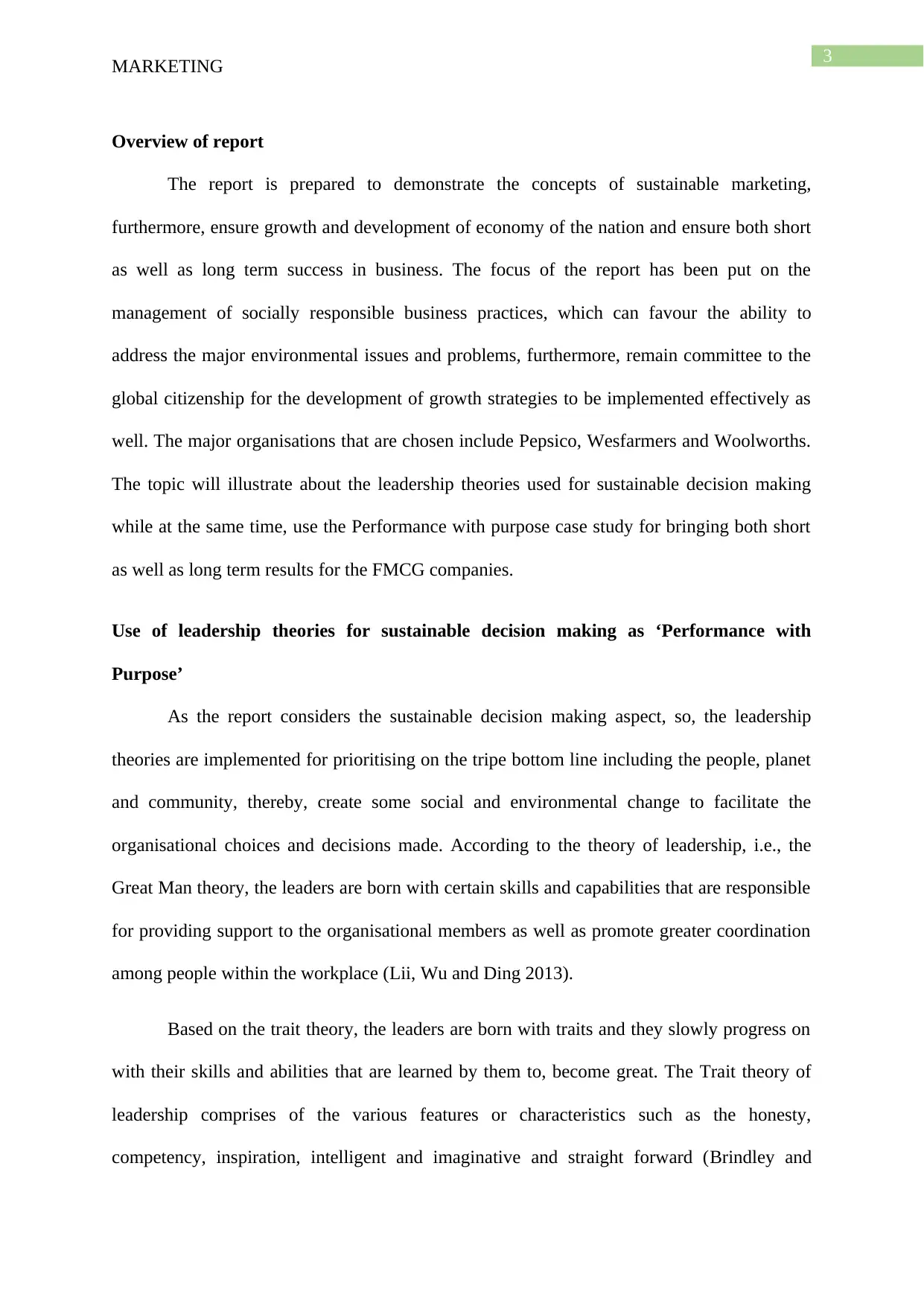
3
MARKETING
Overview of report
The report is prepared to demonstrate the concepts of sustainable marketing,
furthermore, ensure growth and development of economy of the nation and ensure both short
as well as long term success in business. The focus of the report has been put on the
management of socially responsible business practices, which can favour the ability to
address the major environmental issues and problems, furthermore, remain committee to the
global citizenship for the development of growth strategies to be implemented effectively as
well. The major organisations that are chosen include Pepsico, Wesfarmers and Woolworths.
The topic will illustrate about the leadership theories used for sustainable decision making
while at the same time, use the Performance with purpose case study for bringing both short
as well as long term results for the FMCG companies.
Use of leadership theories for sustainable decision making as ‘Performance with
Purpose’
As the report considers the sustainable decision making aspect, so, the leadership
theories are implemented for prioritising on the tripe bottom line including the people, planet
and community, thereby, create some social and environmental change to facilitate the
organisational choices and decisions made. According to the theory of leadership, i.e., the
Great Man theory, the leaders are born with certain skills and capabilities that are responsible
for providing support to the organisational members as well as promote greater coordination
among people within the workplace (Lii, Wu and Ding 2013).
Based on the trait theory, the leaders are born with traits and they slowly progress on
with their skills and abilities that are learned by them to, become great. The Trait theory of
leadership comprises of the various features or characteristics such as the honesty,
competency, inspiration, intelligent and imaginative and straight forward (Brindley and
MARKETING
Overview of report
The report is prepared to demonstrate the concepts of sustainable marketing,
furthermore, ensure growth and development of economy of the nation and ensure both short
as well as long term success in business. The focus of the report has been put on the
management of socially responsible business practices, which can favour the ability to
address the major environmental issues and problems, furthermore, remain committee to the
global citizenship for the development of growth strategies to be implemented effectively as
well. The major organisations that are chosen include Pepsico, Wesfarmers and Woolworths.
The topic will illustrate about the leadership theories used for sustainable decision making
while at the same time, use the Performance with purpose case study for bringing both short
as well as long term results for the FMCG companies.
Use of leadership theories for sustainable decision making as ‘Performance with
Purpose’
As the report considers the sustainable decision making aspect, so, the leadership
theories are implemented for prioritising on the tripe bottom line including the people, planet
and community, thereby, create some social and environmental change to facilitate the
organisational choices and decisions made. According to the theory of leadership, i.e., the
Great Man theory, the leaders are born with certain skills and capabilities that are responsible
for providing support to the organisational members as well as promote greater coordination
among people within the workplace (Lii, Wu and Ding 2013).
Based on the trait theory, the leaders are born with traits and they slowly progress on
with their skills and abilities that are learned by them to, become great. The Trait theory of
leadership comprises of the various features or characteristics such as the honesty,
competency, inspiration, intelligent and imaginative and straight forward (Brindley and
Paraphrase This Document
Need a fresh take? Get an instant paraphrase of this document with our AI Paraphraser
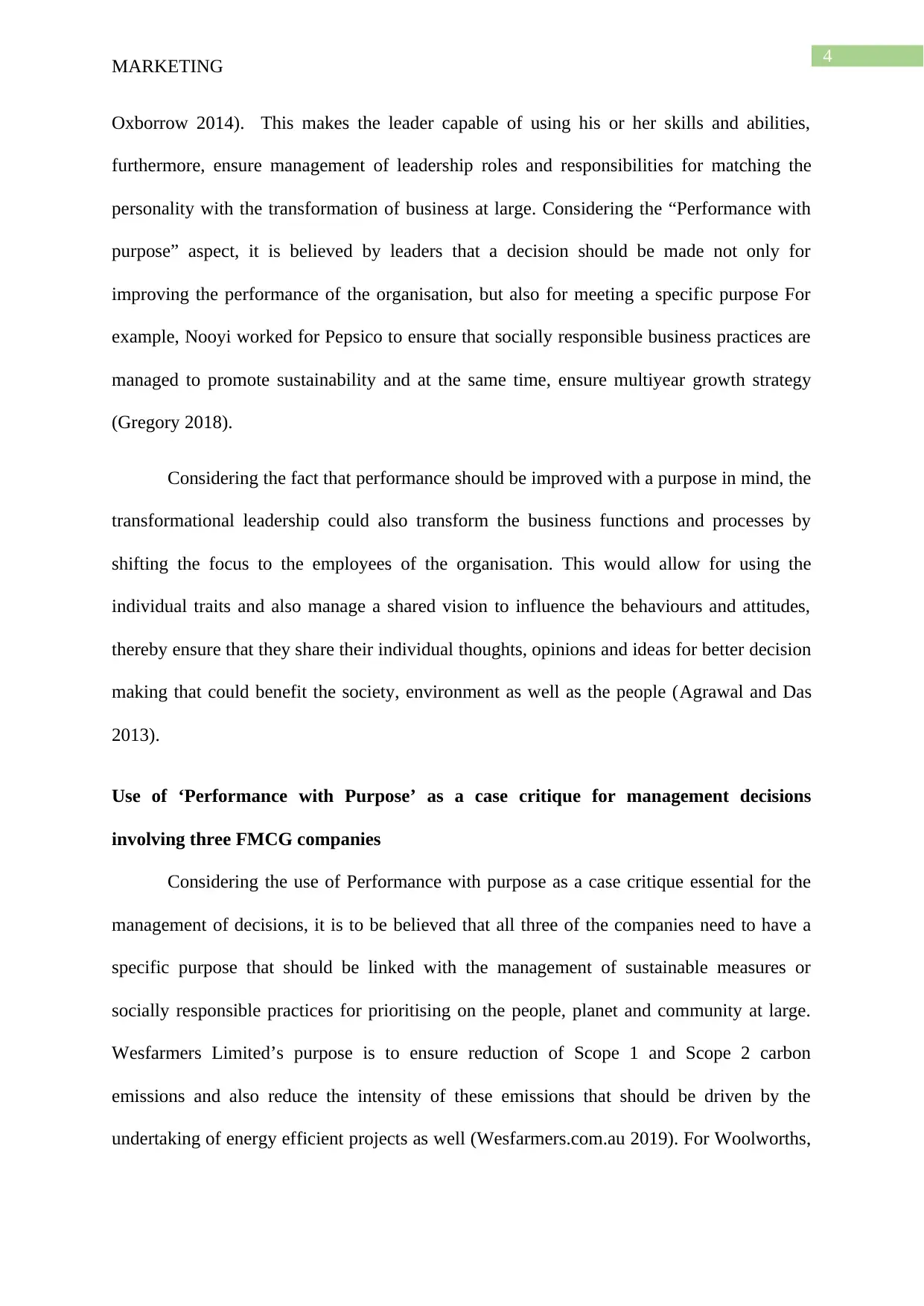
4
MARKETING
Oxborrow 2014). This makes the leader capable of using his or her skills and abilities,
furthermore, ensure management of leadership roles and responsibilities for matching the
personality with the transformation of business at large. Considering the “Performance with
purpose” aspect, it is believed by leaders that a decision should be made not only for
improving the performance of the organisation, but also for meeting a specific purpose For
example, Nooyi worked for Pepsico to ensure that socially responsible business practices are
managed to promote sustainability and at the same time, ensure multiyear growth strategy
(Gregory 2018).
Considering the fact that performance should be improved with a purpose in mind, the
transformational leadership could also transform the business functions and processes by
shifting the focus to the employees of the organisation. This would allow for using the
individual traits and also manage a shared vision to influence the behaviours and attitudes,
thereby ensure that they share their individual thoughts, opinions and ideas for better decision
making that could benefit the society, environment as well as the people (Agrawal and Das
2013).
Use of ‘Performance with Purpose’ as a case critique for management decisions
involving three FMCG companies
Considering the use of Performance with purpose as a case critique essential for the
management of decisions, it is to be believed that all three of the companies need to have a
specific purpose that should be linked with the management of sustainable measures or
socially responsible practices for prioritising on the people, planet and community at large.
Wesfarmers Limited’s purpose is to ensure reduction of Scope 1 and Scope 2 carbon
emissions and also reduce the intensity of these emissions that should be driven by the
undertaking of energy efficient projects as well (Wesfarmers.com.au 2019). For Woolworths,
MARKETING
Oxborrow 2014). This makes the leader capable of using his or her skills and abilities,
furthermore, ensure management of leadership roles and responsibilities for matching the
personality with the transformation of business at large. Considering the “Performance with
purpose” aspect, it is believed by leaders that a decision should be made not only for
improving the performance of the organisation, but also for meeting a specific purpose For
example, Nooyi worked for Pepsico to ensure that socially responsible business practices are
managed to promote sustainability and at the same time, ensure multiyear growth strategy
(Gregory 2018).
Considering the fact that performance should be improved with a purpose in mind, the
transformational leadership could also transform the business functions and processes by
shifting the focus to the employees of the organisation. This would allow for using the
individual traits and also manage a shared vision to influence the behaviours and attitudes,
thereby ensure that they share their individual thoughts, opinions and ideas for better decision
making that could benefit the society, environment as well as the people (Agrawal and Das
2013).
Use of ‘Performance with Purpose’ as a case critique for management decisions
involving three FMCG companies
Considering the use of Performance with purpose as a case critique essential for the
management of decisions, it is to be believed that all three of the companies need to have a
specific purpose that should be linked with the management of sustainable measures or
socially responsible practices for prioritising on the people, planet and community at large.
Wesfarmers Limited’s purpose is to ensure reduction of Scope 1 and Scope 2 carbon
emissions and also reduce the intensity of these emissions that should be driven by the
undertaking of energy efficient projects as well (Wesfarmers.com.au 2019). For Woolworths,
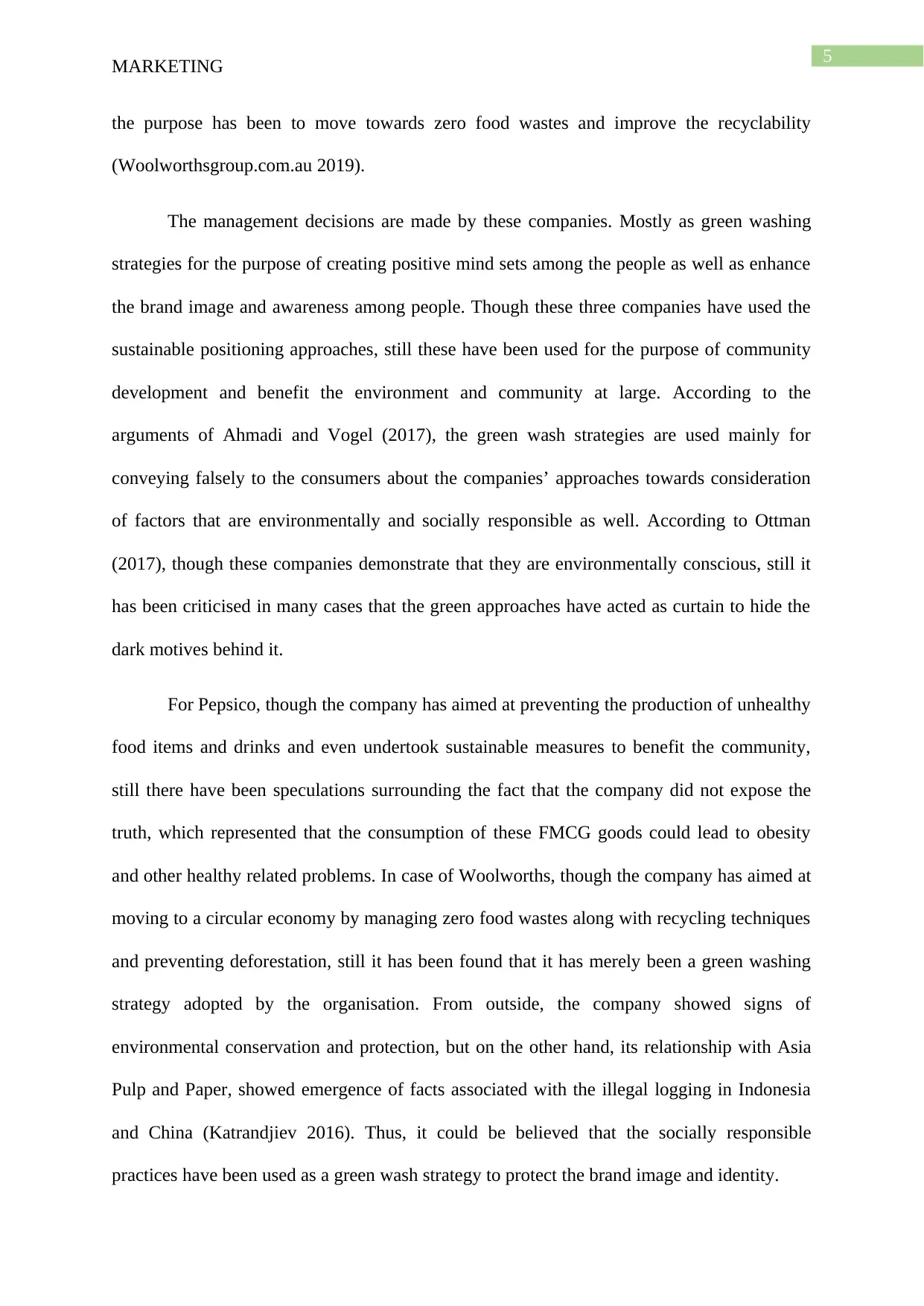
5
MARKETING
the purpose has been to move towards zero food wastes and improve the recyclability
(Woolworthsgroup.com.au 2019).
The management decisions are made by these companies. Mostly as green washing
strategies for the purpose of creating positive mind sets among the people as well as enhance
the brand image and awareness among people. Though these three companies have used the
sustainable positioning approaches, still these have been used for the purpose of community
development and benefit the environment and community at large. According to the
arguments of Ahmadi and Vogel (2017), the green wash strategies are used mainly for
conveying falsely to the consumers about the companies’ approaches towards consideration
of factors that are environmentally and socially responsible as well. According to Ottman
(2017), though these companies demonstrate that they are environmentally conscious, still it
has been criticised in many cases that the green approaches have acted as curtain to hide the
dark motives behind it.
For Pepsico, though the company has aimed at preventing the production of unhealthy
food items and drinks and even undertook sustainable measures to benefit the community,
still there have been speculations surrounding the fact that the company did not expose the
truth, which represented that the consumption of these FMCG goods could lead to obesity
and other healthy related problems. In case of Woolworths, though the company has aimed at
moving to a circular economy by managing zero food wastes along with recycling techniques
and preventing deforestation, still it has been found that it has merely been a green washing
strategy adopted by the organisation. From outside, the company showed signs of
environmental conservation and protection, but on the other hand, its relationship with Asia
Pulp and Paper, showed emergence of facts associated with the illegal logging in Indonesia
and China (Katrandjiev 2016). Thus, it could be believed that the socially responsible
practices have been used as a green wash strategy to protect the brand image and identity.
MARKETING
the purpose has been to move towards zero food wastes and improve the recyclability
(Woolworthsgroup.com.au 2019).
The management decisions are made by these companies. Mostly as green washing
strategies for the purpose of creating positive mind sets among the people as well as enhance
the brand image and awareness among people. Though these three companies have used the
sustainable positioning approaches, still these have been used for the purpose of community
development and benefit the environment and community at large. According to the
arguments of Ahmadi and Vogel (2017), the green wash strategies are used mainly for
conveying falsely to the consumers about the companies’ approaches towards consideration
of factors that are environmentally and socially responsible as well. According to Ottman
(2017), though these companies demonstrate that they are environmentally conscious, still it
has been criticised in many cases that the green approaches have acted as curtain to hide the
dark motives behind it.
For Pepsico, though the company has aimed at preventing the production of unhealthy
food items and drinks and even undertook sustainable measures to benefit the community,
still there have been speculations surrounding the fact that the company did not expose the
truth, which represented that the consumption of these FMCG goods could lead to obesity
and other healthy related problems. In case of Woolworths, though the company has aimed at
moving to a circular economy by managing zero food wastes along with recycling techniques
and preventing deforestation, still it has been found that it has merely been a green washing
strategy adopted by the organisation. From outside, the company showed signs of
environmental conservation and protection, but on the other hand, its relationship with Asia
Pulp and Paper, showed emergence of facts associated with the illegal logging in Indonesia
and China (Katrandjiev 2016). Thus, it could be believed that the socially responsible
practices have been used as a green wash strategy to protect the brand image and identity.
⊘ This is a preview!⊘
Do you want full access?
Subscribe today to unlock all pages.

Trusted by 1+ million students worldwide
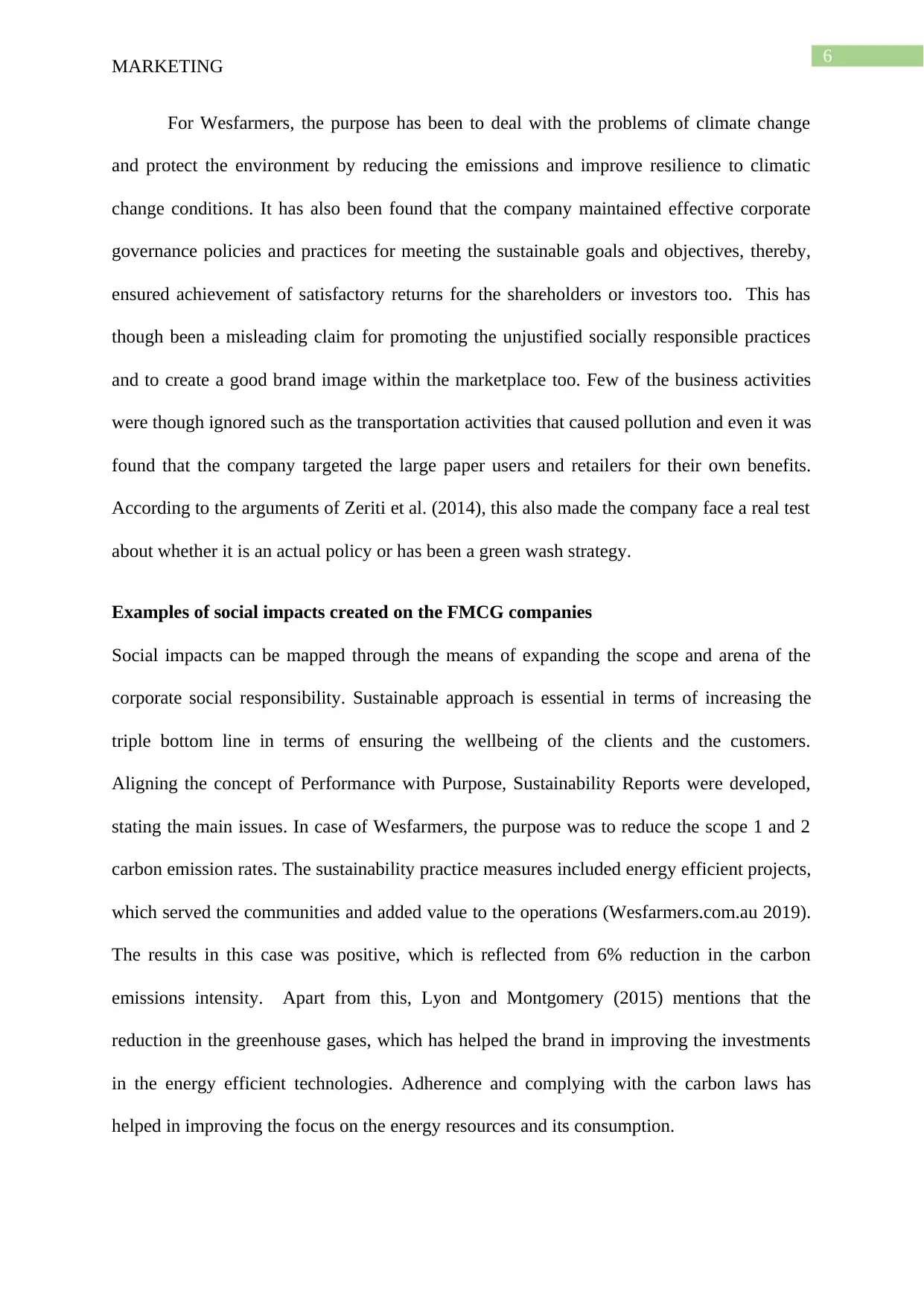
6
MARKETING
For Wesfarmers, the purpose has been to deal with the problems of climate change
and protect the environment by reducing the emissions and improve resilience to climatic
change conditions. It has also been found that the company maintained effective corporate
governance policies and practices for meeting the sustainable goals and objectives, thereby,
ensured achievement of satisfactory returns for the shareholders or investors too. This has
though been a misleading claim for promoting the unjustified socially responsible practices
and to create a good brand image within the marketplace too. Few of the business activities
were though ignored such as the transportation activities that caused pollution and even it was
found that the company targeted the large paper users and retailers for their own benefits.
According to the arguments of Zeriti et al. (2014), this also made the company face a real test
about whether it is an actual policy or has been a green wash strategy.
Examples of social impacts created on the FMCG companies
Social impacts can be mapped through the means of expanding the scope and arena of the
corporate social responsibility. Sustainable approach is essential in terms of increasing the
triple bottom line in terms of ensuring the wellbeing of the clients and the customers.
Aligning the concept of Performance with Purpose, Sustainability Reports were developed,
stating the main issues. In case of Wesfarmers, the purpose was to reduce the scope 1 and 2
carbon emission rates. The sustainability practice measures included energy efficient projects,
which served the communities and added value to the operations (Wesfarmers.com.au 2019).
The results in this case was positive, which is reflected from 6% reduction in the carbon
emissions intensity. Apart from this, Lyon and Montgomery (2015) mentions that the
reduction in the greenhouse gases, which has helped the brand in improving the investments
in the energy efficient technologies. Adherence and complying with the carbon laws has
helped in improving the focus on the energy resources and its consumption.
MARKETING
For Wesfarmers, the purpose has been to deal with the problems of climate change
and protect the environment by reducing the emissions and improve resilience to climatic
change conditions. It has also been found that the company maintained effective corporate
governance policies and practices for meeting the sustainable goals and objectives, thereby,
ensured achievement of satisfactory returns for the shareholders or investors too. This has
though been a misleading claim for promoting the unjustified socially responsible practices
and to create a good brand image within the marketplace too. Few of the business activities
were though ignored such as the transportation activities that caused pollution and even it was
found that the company targeted the large paper users and retailers for their own benefits.
According to the arguments of Zeriti et al. (2014), this also made the company face a real test
about whether it is an actual policy or has been a green wash strategy.
Examples of social impacts created on the FMCG companies
Social impacts can be mapped through the means of expanding the scope and arena of the
corporate social responsibility. Sustainable approach is essential in terms of increasing the
triple bottom line in terms of ensuring the wellbeing of the clients and the customers.
Aligning the concept of Performance with Purpose, Sustainability Reports were developed,
stating the main issues. In case of Wesfarmers, the purpose was to reduce the scope 1 and 2
carbon emission rates. The sustainability practice measures included energy efficient projects,
which served the communities and added value to the operations (Wesfarmers.com.au 2019).
The results in this case was positive, which is reflected from 6% reduction in the carbon
emissions intensity. Apart from this, Lyon and Montgomery (2015) mentions that the
reduction in the greenhouse gases, which has helped the brand in improving the investments
in the energy efficient technologies. Adherence and complying with the carbon laws has
helped in improving the focus on the energy resources and its consumption.
Paraphrase This Document
Need a fresh take? Get an instant paraphrase of this document with our AI Paraphraser
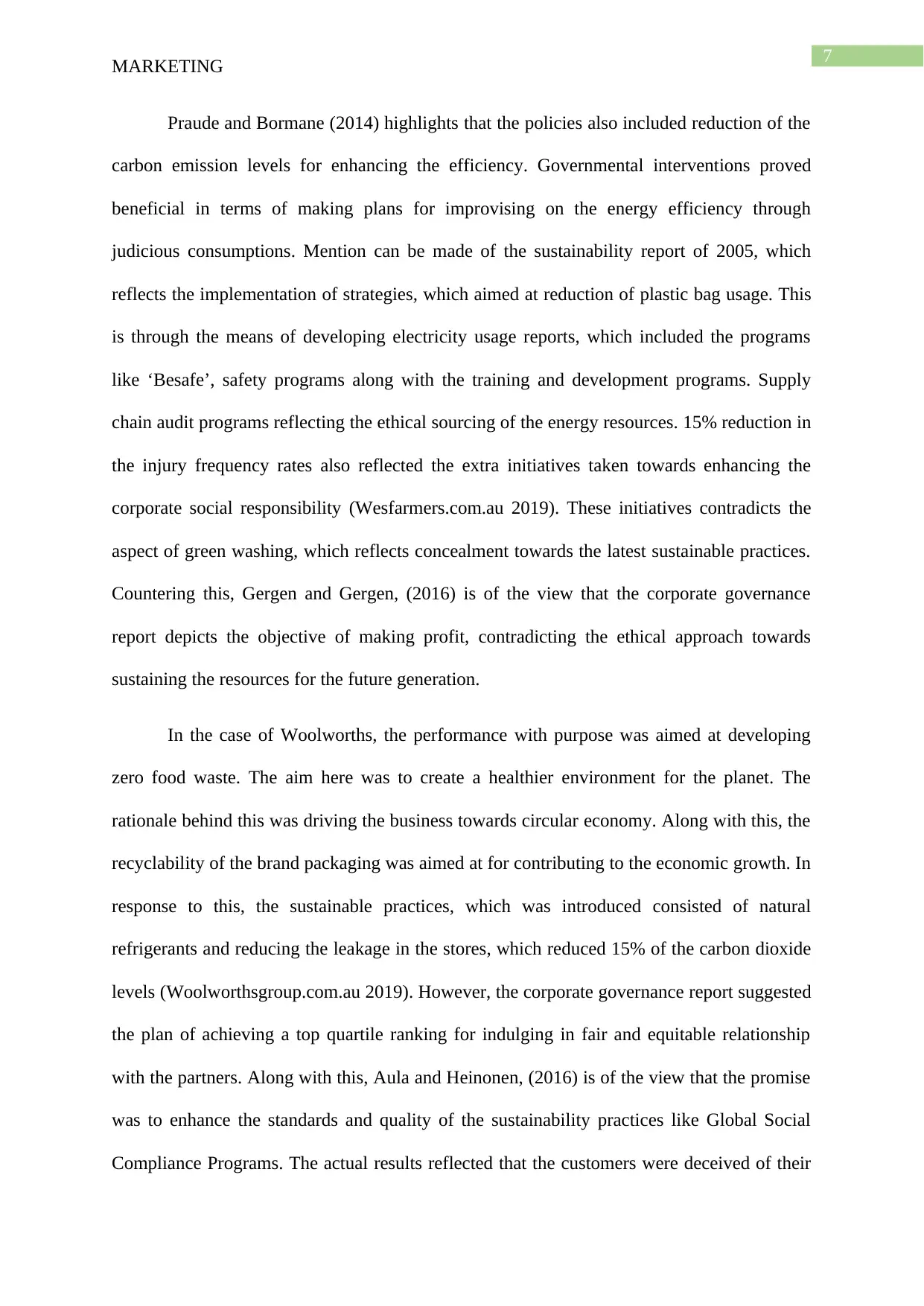
7
MARKETING
Praude and Bormane (2014) highlights that the policies also included reduction of the
carbon emission levels for enhancing the efficiency. Governmental interventions proved
beneficial in terms of making plans for improvising on the energy efficiency through
judicious consumptions. Mention can be made of the sustainability report of 2005, which
reflects the implementation of strategies, which aimed at reduction of plastic bag usage. This
is through the means of developing electricity usage reports, which included the programs
like ‘Besafe’, safety programs along with the training and development programs. Supply
chain audit programs reflecting the ethical sourcing of the energy resources. 15% reduction in
the injury frequency rates also reflected the extra initiatives taken towards enhancing the
corporate social responsibility (Wesfarmers.com.au 2019). These initiatives contradicts the
aspect of green washing, which reflects concealment towards the latest sustainable practices.
Countering this, Gergen and Gergen, (2016) is of the view that the corporate governance
report depicts the objective of making profit, contradicting the ethical approach towards
sustaining the resources for the future generation.
In the case of Woolworths, the performance with purpose was aimed at developing
zero food waste. The aim here was to create a healthier environment for the planet. The
rationale behind this was driving the business towards circular economy. Along with this, the
recyclability of the brand packaging was aimed at for contributing to the economic growth. In
response to this, the sustainable practices, which was introduced consisted of natural
refrigerants and reducing the leakage in the stores, which reduced 15% of the carbon dioxide
levels (Woolworthsgroup.com.au 2019). However, the corporate governance report suggested
the plan of achieving a top quartile ranking for indulging in fair and equitable relationship
with the partners. Along with this, Aula and Heinonen, (2016) is of the view that the promise
was to enhance the standards and quality of the sustainability practices like Global Social
Compliance Programs. The actual results reflected that the customers were deceived of their
MARKETING
Praude and Bormane (2014) highlights that the policies also included reduction of the
carbon emission levels for enhancing the efficiency. Governmental interventions proved
beneficial in terms of making plans for improvising on the energy efficiency through
judicious consumptions. Mention can be made of the sustainability report of 2005, which
reflects the implementation of strategies, which aimed at reduction of plastic bag usage. This
is through the means of developing electricity usage reports, which included the programs
like ‘Besafe’, safety programs along with the training and development programs. Supply
chain audit programs reflecting the ethical sourcing of the energy resources. 15% reduction in
the injury frequency rates also reflected the extra initiatives taken towards enhancing the
corporate social responsibility (Wesfarmers.com.au 2019). These initiatives contradicts the
aspect of green washing, which reflects concealment towards the latest sustainable practices.
Countering this, Gergen and Gergen, (2016) is of the view that the corporate governance
report depicts the objective of making profit, contradicting the ethical approach towards
sustaining the resources for the future generation.
In the case of Woolworths, the performance with purpose was aimed at developing
zero food waste. The aim here was to create a healthier environment for the planet. The
rationale behind this was driving the business towards circular economy. Along with this, the
recyclability of the brand packaging was aimed at for contributing to the economic growth. In
response to this, the sustainable practices, which was introduced consisted of natural
refrigerants and reducing the leakage in the stores, which reduced 15% of the carbon dioxide
levels (Woolworthsgroup.com.au 2019). However, the corporate governance report suggested
the plan of achieving a top quartile ranking for indulging in fair and equitable relationship
with the partners. Along with this, Aula and Heinonen, (2016) is of the view that the promise
was to enhance the standards and quality of the sustainability practices like Global Social
Compliance Programs. The actual results reflected that the customers were deceived of their
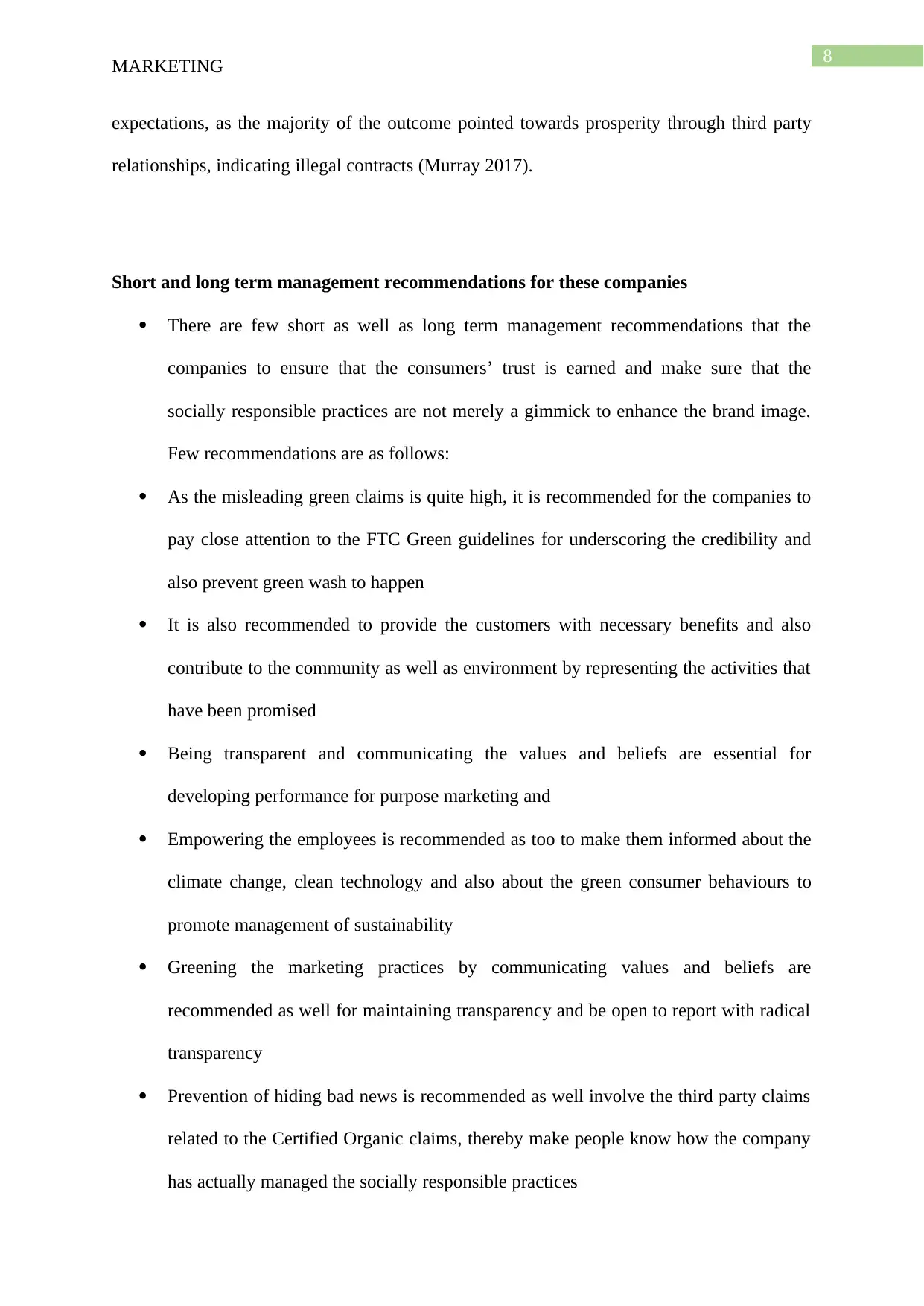
8
MARKETING
expectations, as the majority of the outcome pointed towards prosperity through third party
relationships, indicating illegal contracts (Murray 2017).
Short and long term management recommendations for these companies
There are few short as well as long term management recommendations that the
companies to ensure that the consumers’ trust is earned and make sure that the
socially responsible practices are not merely a gimmick to enhance the brand image.
Few recommendations are as follows:
As the misleading green claims is quite high, it is recommended for the companies to
pay close attention to the FTC Green guidelines for underscoring the credibility and
also prevent green wash to happen
It is also recommended to provide the customers with necessary benefits and also
contribute to the community as well as environment by representing the activities that
have been promised
Being transparent and communicating the values and beliefs are essential for
developing performance for purpose marketing and
Empowering the employees is recommended as too to make them informed about the
climate change, clean technology and also about the green consumer behaviours to
promote management of sustainability
Greening the marketing practices by communicating values and beliefs are
recommended as well for maintaining transparency and be open to report with radical
transparency
Prevention of hiding bad news is recommended as well involve the third party claims
related to the Certified Organic claims, thereby make people know how the company
has actually managed the socially responsible practices
MARKETING
expectations, as the majority of the outcome pointed towards prosperity through third party
relationships, indicating illegal contracts (Murray 2017).
Short and long term management recommendations for these companies
There are few short as well as long term management recommendations that the
companies to ensure that the consumers’ trust is earned and make sure that the
socially responsible practices are not merely a gimmick to enhance the brand image.
Few recommendations are as follows:
As the misleading green claims is quite high, it is recommended for the companies to
pay close attention to the FTC Green guidelines for underscoring the credibility and
also prevent green wash to happen
It is also recommended to provide the customers with necessary benefits and also
contribute to the community as well as environment by representing the activities that
have been promised
Being transparent and communicating the values and beliefs are essential for
developing performance for purpose marketing and
Empowering the employees is recommended as too to make them informed about the
climate change, clean technology and also about the green consumer behaviours to
promote management of sustainability
Greening the marketing practices by communicating values and beliefs are
recommended as well for maintaining transparency and be open to report with radical
transparency
Prevention of hiding bad news is recommended as well involve the third party claims
related to the Certified Organic claims, thereby make people know how the company
has actually managed the socially responsible practices
⊘ This is a preview!⊘
Do you want full access?
Subscribe today to unlock all pages.

Trusted by 1+ million students worldwide
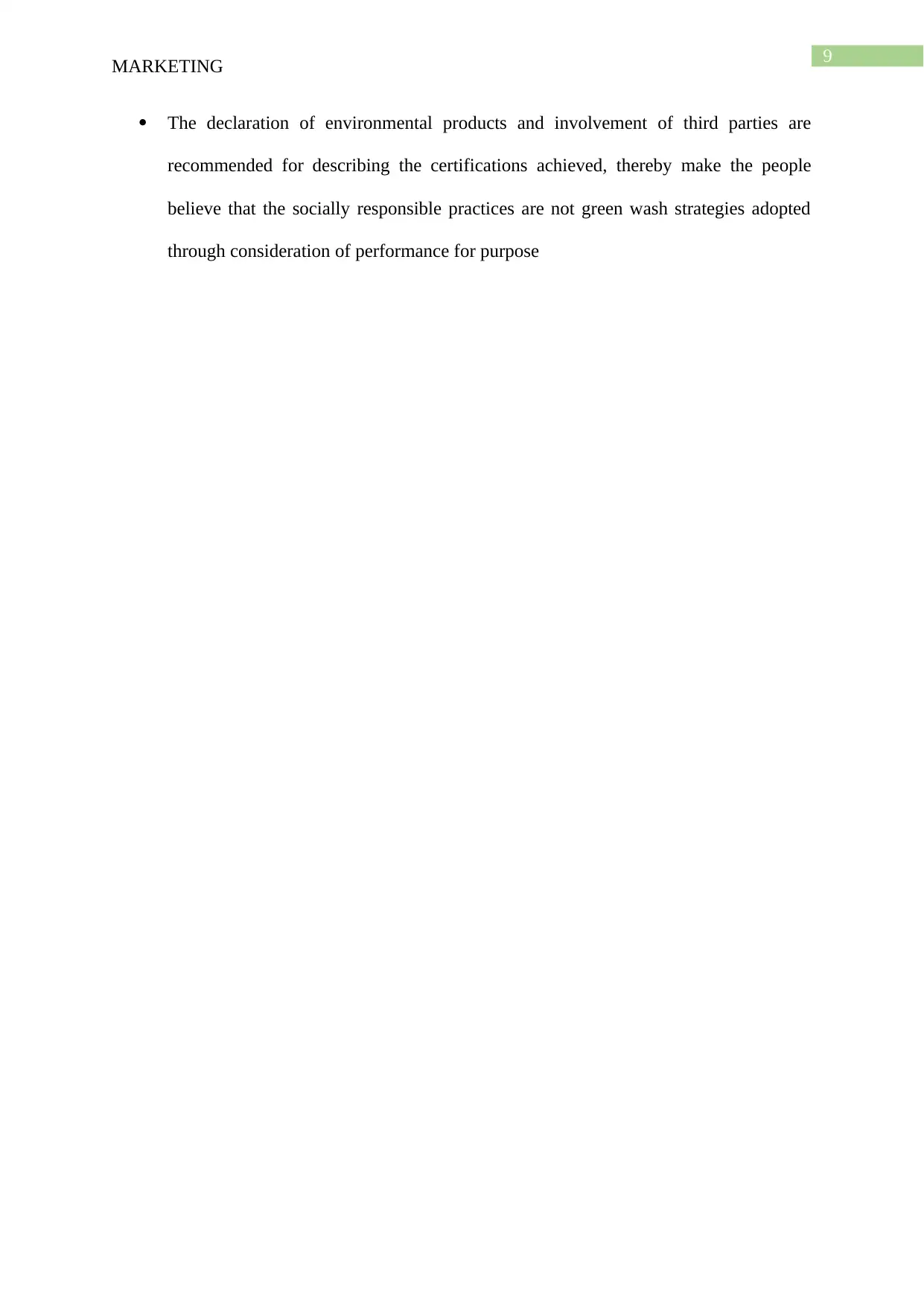
9
MARKETING
The declaration of environmental products and involvement of third parties are
recommended for describing the certifications achieved, thereby make the people
believe that the socially responsible practices are not green wash strategies adopted
through consideration of performance for purpose
MARKETING
The declaration of environmental products and involvement of third parties are
recommended for describing the certifications achieved, thereby make the people
believe that the socially responsible practices are not green wash strategies adopted
through consideration of performance for purpose
Paraphrase This Document
Need a fresh take? Get an instant paraphrase of this document with our AI Paraphraser
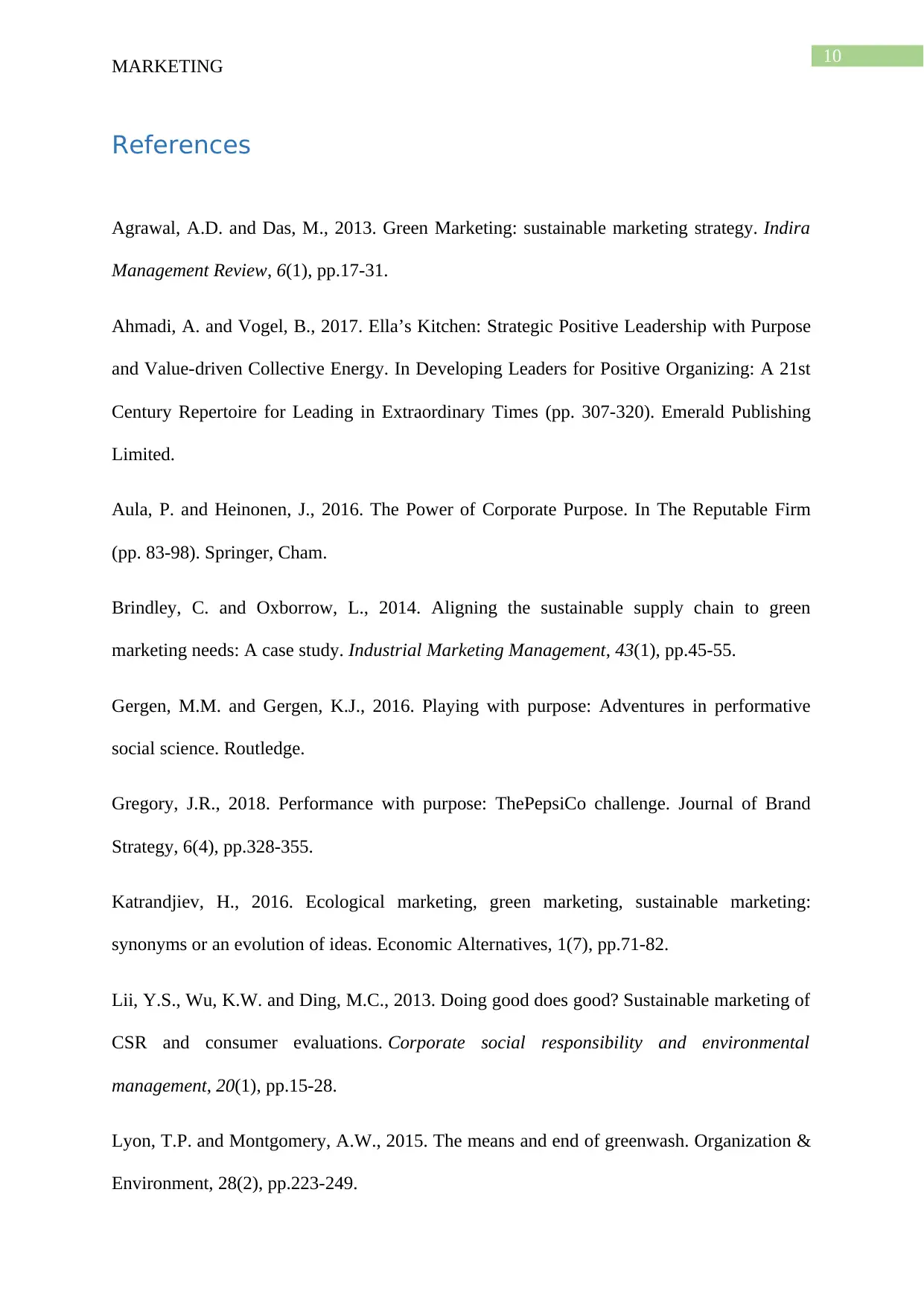
10
MARKETING
References
Agrawal, A.D. and Das, M., 2013. Green Marketing: sustainable marketing strategy. Indira
Management Review, 6(1), pp.17-31.
Ahmadi, A. and Vogel, B., 2017. Ella’s Kitchen: Strategic Positive Leadership with Purpose
and Value-driven Collective Energy. In Developing Leaders for Positive Organizing: A 21st
Century Repertoire for Leading in Extraordinary Times (pp. 307-320). Emerald Publishing
Limited.
Aula, P. and Heinonen, J., 2016. The Power of Corporate Purpose. In The Reputable Firm
(pp. 83-98). Springer, Cham.
Brindley, C. and Oxborrow, L., 2014. Aligning the sustainable supply chain to green
marketing needs: A case study. Industrial Marketing Management, 43(1), pp.45-55.
Gergen, M.M. and Gergen, K.J., 2016. Playing with purpose: Adventures in performative
social science. Routledge.
Gregory, J.R., 2018. Performance with purpose: ThePepsiCo challenge. Journal of Brand
Strategy, 6(4), pp.328-355.
Katrandjiev, H., 2016. Ecological marketing, green marketing, sustainable marketing:
synonyms оr аn evolution оf ideas. Economic Alternatives, 1(7), pp.71-82.
Lii, Y.S., Wu, K.W. and Ding, M.C., 2013. Doing good does good? Sustainable marketing of
CSR and consumer evaluations. Corporate social responsibility and environmental
management, 20(1), pp.15-28.
Lyon, T.P. and Montgomery, A.W., 2015. The means and end of greenwash. Organization &
Environment, 28(2), pp.223-249.
MARKETING
References
Agrawal, A.D. and Das, M., 2013. Green Marketing: sustainable marketing strategy. Indira
Management Review, 6(1), pp.17-31.
Ahmadi, A. and Vogel, B., 2017. Ella’s Kitchen: Strategic Positive Leadership with Purpose
and Value-driven Collective Energy. In Developing Leaders for Positive Organizing: A 21st
Century Repertoire for Leading in Extraordinary Times (pp. 307-320). Emerald Publishing
Limited.
Aula, P. and Heinonen, J., 2016. The Power of Corporate Purpose. In The Reputable Firm
(pp. 83-98). Springer, Cham.
Brindley, C. and Oxborrow, L., 2014. Aligning the sustainable supply chain to green
marketing needs: A case study. Industrial Marketing Management, 43(1), pp.45-55.
Gergen, M.M. and Gergen, K.J., 2016. Playing with purpose: Adventures in performative
social science. Routledge.
Gregory, J.R., 2018. Performance with purpose: ThePepsiCo challenge. Journal of Brand
Strategy, 6(4), pp.328-355.
Katrandjiev, H., 2016. Ecological marketing, green marketing, sustainable marketing:
synonyms оr аn evolution оf ideas. Economic Alternatives, 1(7), pp.71-82.
Lii, Y.S., Wu, K.W. and Ding, M.C., 2013. Doing good does good? Sustainable marketing of
CSR and consumer evaluations. Corporate social responsibility and environmental
management, 20(1), pp.15-28.
Lyon, T.P. and Montgomery, A.W., 2015. The means and end of greenwash. Organization &
Environment, 28(2), pp.223-249.
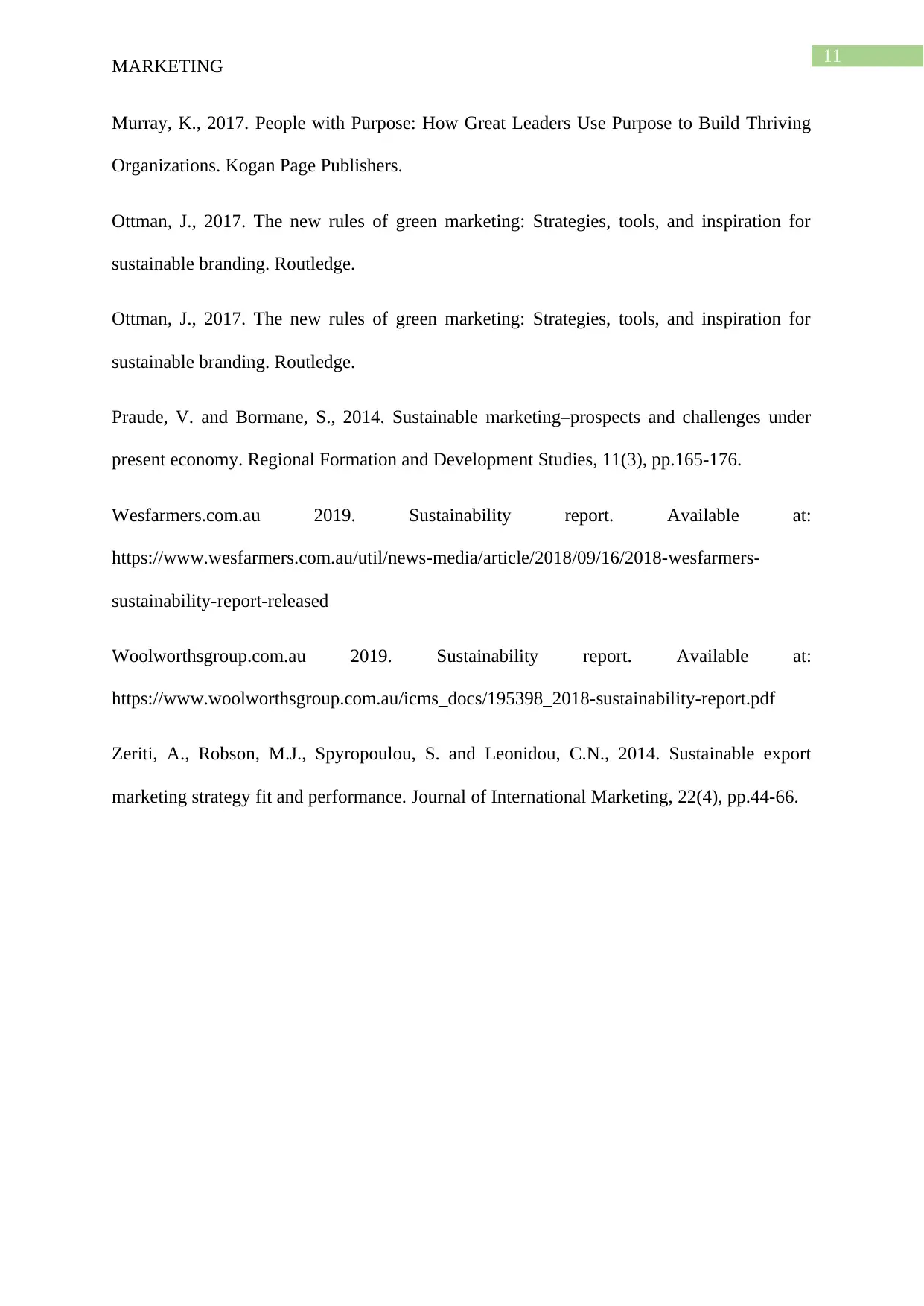
11
MARKETING
Murray, K., 2017. People with Purpose: How Great Leaders Use Purpose to Build Thriving
Organizations. Kogan Page Publishers.
Ottman, J., 2017. The new rules of green marketing: Strategies, tools, and inspiration for
sustainable branding. Routledge.
Ottman, J., 2017. The new rules of green marketing: Strategies, tools, and inspiration for
sustainable branding. Routledge.
Praude, V. and Bormane, S., 2014. Sustainable marketing–prospects and challenges under
present economy. Regional Formation and Development Studies, 11(3), pp.165-176.
Wesfarmers.com.au 2019. Sustainability report. Available at:
https://www.wesfarmers.com.au/util/news-media/article/2018/09/16/2018-wesfarmers-
sustainability-report-released
Woolworthsgroup.com.au 2019. Sustainability report. Available at:
https://www.woolworthsgroup.com.au/icms_docs/195398_2018-sustainability-report.pdf
Zeriti, A., Robson, M.J., Spyropoulou, S. and Leonidou, C.N., 2014. Sustainable export
marketing strategy fit and performance. Journal of International Marketing, 22(4), pp.44-66.
MARKETING
Murray, K., 2017. People with Purpose: How Great Leaders Use Purpose to Build Thriving
Organizations. Kogan Page Publishers.
Ottman, J., 2017. The new rules of green marketing: Strategies, tools, and inspiration for
sustainable branding. Routledge.
Ottman, J., 2017. The new rules of green marketing: Strategies, tools, and inspiration for
sustainable branding. Routledge.
Praude, V. and Bormane, S., 2014. Sustainable marketing–prospects and challenges under
present economy. Regional Formation and Development Studies, 11(3), pp.165-176.
Wesfarmers.com.au 2019. Sustainability report. Available at:
https://www.wesfarmers.com.au/util/news-media/article/2018/09/16/2018-wesfarmers-
sustainability-report-released
Woolworthsgroup.com.au 2019. Sustainability report. Available at:
https://www.woolworthsgroup.com.au/icms_docs/195398_2018-sustainability-report.pdf
Zeriti, A., Robson, M.J., Spyropoulou, S. and Leonidou, C.N., 2014. Sustainable export
marketing strategy fit and performance. Journal of International Marketing, 22(4), pp.44-66.
⊘ This is a preview!⊘
Do you want full access?
Subscribe today to unlock all pages.

Trusted by 1+ million students worldwide
1 out of 12
Related Documents
Your All-in-One AI-Powered Toolkit for Academic Success.
+13062052269
info@desklib.com
Available 24*7 on WhatsApp / Email
![[object Object]](/_next/static/media/star-bottom.7253800d.svg)
Unlock your academic potential
Copyright © 2020–2025 A2Z Services. All Rights Reserved. Developed and managed by ZUCOL.





